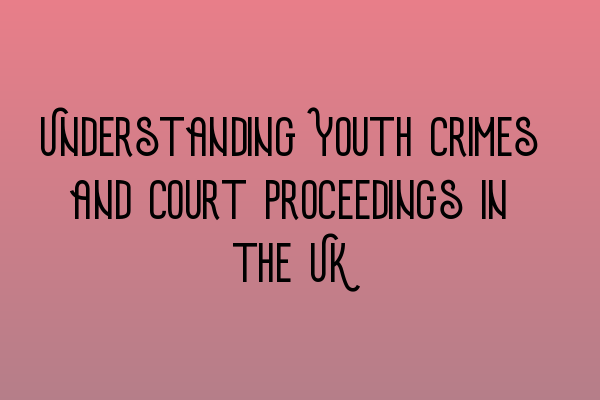Understanding Youth Crimes and Court Proceedings in the UK
Introduction
Youth crimes are a concerning issue in the UK, as they not only impact the lives of young individuals but also the overall safety of our communities. In this blog post, we will delve into the intricacies of youth crimes and the court proceedings that follow. By gaining a deeper understanding of these matters, we can work towards preventing and addressing youth crimes more effectively.
Defining Youth Crimes
Youth crimes refer to criminal offenses committed by individuals who are under the age of 18. These offenses can range from minor actions such as shoplifting to more serious crimes like assault or drug-related offenses. It is crucial to remember that young individuals who engage in criminal behavior often do so due to a variety of complex factors, including their environment, upbringing, and peer influence.
Youth Court System in the UK
The UK has a specialized court system to tackle youth crimes, known as the youth court. This court operates separately from adult courts and employs processes tailored to the unique circumstances surrounding youth offenders. The guiding principles of the youth court are to focus on the welfare and rehabilitation of young individuals rather than solely on punitive measures.
The Sentencing Procedure
When a young person is charged with a crime, the case is typically referred to the youth court. The sentencing procedure in youth court involves several steps:
1. Case Preparation: The prosecution gathers evidence to present during the trial, including witness statements, CCTV footage, and any other relevant information.
2. Pre-court Planning: A pre-court planning meeting takes place to explore potential solutions that prioritize rehabilitation and reduce the risk of reoffending. This may involve counseling, community service, or a referral to a specialized youth team.
3. The Trial: The trial takes place in the youth court, presided over by a District Judge or a panel of magistrates. A legal advisor is present to guide the young person throughout the proceedings.
4. Sentencing: If the young person is found guilty, the court determines an appropriate sentence, taking into account factors such as the severity of the offense, the individual’s age and maturity, and any prior convictions.
Rehabilitation and Support
The youth court aims to rehabilitate young offenders and provide them with the necessary skills and support to become law-abiding members of society. Sentences may include various measures such as community service, attendance at educational programs, or referral to youth offending teams. These teams work closely with young individuals, offering counseling, guidance, and support to address the underlying causes of criminal behavior.
Preventing Youth Crimes
Prevention is undeniably better than cure when it comes to youth crimes. Some strategies to prevent youth offenses include:
1. Early Intervention: Identifying and addressing risk factors in a young person’s life at an early stage can help prevent them from turning to criminal behavior.
2. Education and Awareness: Educating young individuals about the consequences of their actions and promoting awareness about the impact of crime can be instrumental in deterring them from engaging in criminal behavior.
3. Supportive Communities: Building strong and supportive communities that provide positive role models and opportunities for engagement can help steer young individuals away from criminal activities.
Conclusion
Understanding youth crimes and court proceedings in the UK is essential for effectively addressing this issue and working towards its prevention. By nurturing a compassionate and rehabilitative approach through the youth court system, we have the opportunity to guide young individuals towards a better future. Let us continue to prioritize the well-being and rehabilitation of our youth, ensuring a safer and more prosperous society for all.
